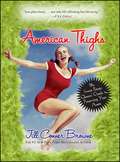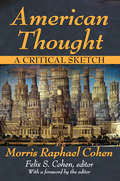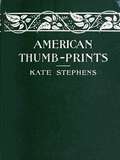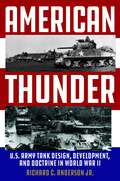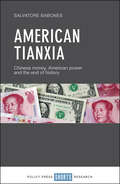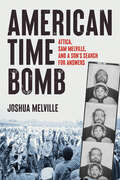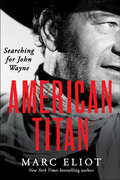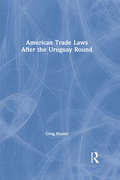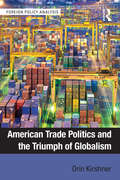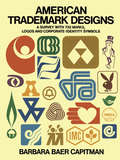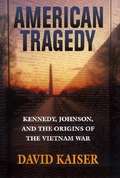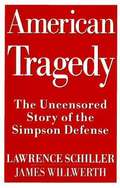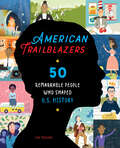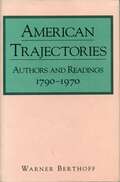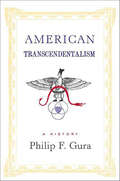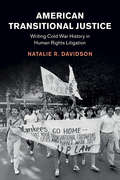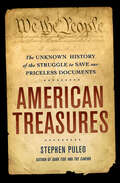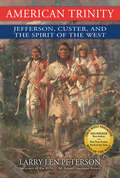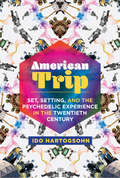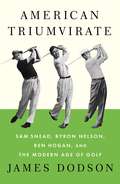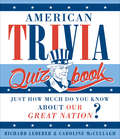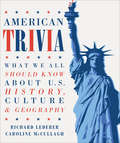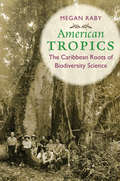- Table View
- List View
American Thighs
by Jill Conner Browne"If I can save one woman from these thighs, I will not have lived in vain," #1New York Timesbestselling humorist Jill Conner Browne writes inAmerican Thighs, her handbook and memoir for the Hot and Flashy. Whether young enough to look "hot" or of the age to onlyfeelthat way (in flashes with buckets of sweat), every woman has given, or will give, ample thought to preserving her best "assets" (thighs included), so that the dread transition from "cute girl" to "ma'am" won't be quite so unsettling. Here are stories of growing up and learning about life -- usually the hard way! From disastrous haircuts and color jobs to fashion or verbal faux pas committed, from the kiss wished for but never gotten to the one that should have been skipped, these are the moments that mark each of our journeys from what we thought back then to what we now know. Since to say that Youth is wasted on the Young has got to betheunderstatement of all time, it falls upon Browne, as one older and wiser, to take a "Hit and Run" down Memory Lane for the sake of offering "Asset-Preserving Tips," with astonishing disclosures about: Why women have risked their lives just to get a little bit blonder How the muumuu has been fashionably resurrected as the "patio dress" Why it's important to always have a good photo of yourself on hand -- just in case How, no matter what skin you're in, to make it last a lifetime Why you can never trust anyone over eighty-five
American Thought: A Critical Sketch
by Morris CohenWhat constitutes American thought is obviously too elusive to be encompassed by any one writer or group of writers. The best that any attempt at intellectual history can achieve is to indicate some of its traces in written records. This volume represents the eff orts of one of America's leading philosophers to do just that. He is uniquely qualified to do so, as his contemporary Sidney Hook well understood.As Cohen noted, most of what people say and write is dominated by linguistic forms or habits. Thus the dominance of the traditions and habits that make up the English language has been the strongest single infl uence in fashioning American thought as very largely a province of British thought - despite the Declaration of Independence and two wars. Cohen describes how American thought developed from its British roots. It deals with reflective thought, i.e. with thought that is conscious of its problems, of its methods and of the widest general bearings of the results obtained so far. The diverse subjects discussed range from religious thinking to the scientific, and from the legal tradition to literary criticism.Among the important figures Cohen assesses are Dewey, Santayana, Holmes, Brandeis, Whitehead, James, and Royce as well as those of men less well-known but sometimes equally influential. In its scope and insight, this book takes its own unique and important place in American thought.
American Thumb-prints: Mettle of Our Men and Women
by Kate StephensAmerican Thumb-prints: Mettle of Our Men and Women
American Thunder: U.S. Army Tank Design, Development, and Doctrine in World War II
by Richard C. Anderson Jr.If the machine gun changed the course of ground combat in the First World War, it was the tank that shaped ground combat in World War II. The tank was introduced in World War I in an effort to end the stalemate of the machine gun versus barbed-wire trenches, and by World War II, the tank&’s mobility and firepower became a rolling, thundering difference-maker on the battlefield. In this detailed, deeply researched, and heavily illustrated book, tank expert Richard Anderson tells the story of how the United States developed its armored force, turning it into a war-winning weapon in World War II that powered American ground forces and supplied armies around the world, including the British and Soviets.For decades, American tanks of World War II have been undervalued in comparisons with German and Soviet tanks—and it&’s true that the best of American armor tended to underperform the best of German and Soviet armor during the war. That&’s because the U.S. had a different goal: not only to create battleworthy tanks like the Sherman, and to develop other tanks, but also to supply American allies with serviceable, combat-ready tanks. The United States did all this, but until now the complete story of American tanks in World War II has yet to be told.Anderson&’s book is deeper and more thorough a chronicle of American tanks in World War II than has ever been done. This book is colorful, vivid, and thought-provokingly insightful on how the U.S. produced a tank force capable of conducting its own battlefield efforts and sustaining key allies around the world. This will be the go-to volume on American tanks for years to come.
American Tianxia: Chinese Money, American Power and the End of History
by Salvatore BabonesAfter a meteoric rise, China's once inexorable growth has come to a screeching halt. With it ends China's dream of establishing a new tianxia (‘harmonious order’) in Asia with China at its centre. Salvatore Babones provides an up-to-date assessment of China's economic problems and how they are undermining China's challenge to the Western-dominated world order. As China's neighbours and many of its own most talented people look to the United States to ensure their security and prosperity, global power is slowly but surely consolidating in a twenty-first century American Tianxia. A closely argued antidote to defeatist accounts of Western decline, this book tells the story of how liberal individualism has become the leitmotif of the American Tianxia, an emerging world-system in which people of all nationalities seek a share in the economic, cultural, and political system that is America writ large.
American Time Bomb: Attica, Sam Melville, and a Son's Search for Answers
by Joshua Melville"American Time Bomb is a vital read for this moment. " —Heather Ann Thompson, author of the Pulitzer Prize–winning Blood in the Water: The Attica Prison Uprising of 1971 and Its Legacy Few stories are more central to understanding our history of racially biased incarceration and violent social activism than the life of Sam Melville. Melville was both reviled and admired as one of the most feared radicals in post–World War II history. His importance in the 1960s is widely recognized by historians and scholars as epitomizing the controversies, the promise, and the problems of the New Left. This memoir by Melville's son opens a window into the personal life of a legend, revealing the universal and all-too-human foibles motivating those driven to make change through violence. In the current political climate, at the fiftieth anniversary of the Attica Uprising, this nation grows increasingly interested in the racially biased incarceration and violent social activism that has shaped our nation. There are few stories more central to both subjects than the life of Sam Melville, who was often called "the Mad Bomber." American Time Bomb is a son's personal portrait based on years of investigation of Melville's story and the history he helped to create.Joshua Melville's personal connection to the story gives a gut-wrenching multigenerational tale of childhood abandonment but also adds a compelling historical study of politics, history, and issues of social justice.
American Titan: Searching for John Wayne
by Marc EliotAs he did in his bestselling biographies of Cary Grant, Jimmy Stewart, and Clint Eastwood, Marc Eliot offers an exciting, groundbreaking new take on an American icon—the most legendary Western film hero of all time, John WayneAn audience favorite and top box-office draw for decades, John Wayne symbolized masculinity, power, and patriotism, and inspired millions of Americans. Yet despite his popularity and success, he was unfairly dismissed as a "B" movie actor lacking elegance, creativity, range, and depth. American Titan challenges conventional wisdom and reevaluates Wayne's life and vital cinematic legacy, ultimately placing the man known as "Duke" among a select and brilliant pantheon of "actor auteurs"—artists whose consistency of style in their work reflects their personal creative vision.In American Titan, Eliot demonstrates that Wayne possessed a distinct and remarkable vision rooted in his unique Midwestern and West Coast childhood that would become manifest in one of the most enduring screen personalities of all time: the elusive, stoic frontier loner. Wayne's heroic outsider also influenced a new generation of actors and filmmakers who would borrow from it to use in their own movies.Drawing on his deep, extensive knowledge of Hollywood and film, Eliot contends that the primary driving force behind Wayne's extraordinary career and body of work was the result of his own ambitions and his collaborations with directors John Ford and Howard Hawks. Eliot offers as evidence the distinct personality that runs through Wayne's staggering 169 films, from Stage Coach and The Searchers to The Quiet Man and The Green Berets.Setting Wayne's life within the sweeping political and social transformations that defined the nation, Eliot's masterly revisionist portrait is a remarkable in-depth look at a life that embodied the spirit of the twentieth century. What emerges is nothing less than a powerful understanding of and appreciation for a true American titan.Marc Eliot is the New York Times bestselling author of more than a dozen books on popular culture, among them the highly acclaimed Cary Grant, the award-winning Walt Disney: Hollywood's Dark Prince, and American Rebel: The Life of Clint Eastwood. He writes for a number of publications and frequently speaks about film at universities and to film groups, and on radio and television. He lives in New York City and Woodstock, New York.MarcEliot.net
American Trade Laws After the Uruguay Round
by Greg MastelThis text seeks to anaylze the three pillars of US trade law: Section 301, aimed at opening foreign markets for US exports; anti-dumping law, which seeks to counter anti-competitive tactics by foreign firms; and counterveiling duty law that aims to counter foreign governmental law.
American Trade Politics
by I. M. DestlerIn this comprehensive revision of the most influential, widely read analysis of the US trade policymaking system, Destler addresses how globalization has reshaped trade politics, weakening traditional protectionism but intensifying concern about trade's societal impacts. <p><p>Entirely new chapters treat the deepening of partisan divisions and the rise of "trade and..." issues (especially labor and the environment). The author concludes with a comprehensive economic and political strategy to cope with globalization and maximize its benefits.
American Trade Politics and the Triumph of Globalism (Foreign Policy Analysis)
by Orin KirshnerA deep and unresolved tension exists within American trade politics between the nation’s promotion of an open world trading system and the operations of its democratic domestic political regime. Whereas most scholarly attention has focused on how domestic politics has interfered with the United States’ global economic leadership, Orin Kirshner offers here an analysis of the ways in which U.S. leadership in the arena of global trade has affected American democracy and the domestic political regime. By participating in multilateral trade agreements, the U.S. Congress has transferred its trade policymaking authority to the president and, through international trade negotiations, from the American state to the GATT/WTO regime. This reorganization of policymaking authority has resulted in the "triumph of globalism," and fundamentally alters the citizen-state relationship assumed in democratic theory. Kirshner illustrates this process through four case studies: The Reciprocal Trade Agreements Act of 1945, The Trade Expansion Act of 1962, The Trade Act of 1974, The Omnibus Trade and Competitiveness Act of 1988, and further examines the impact of the Uruguay Round Agreements Act of 1994 on the political and institutional structure of American trade politics up to the current period. American Trade Politics and the Triumph of Globalism makes a significant contribution to the study of both international trade and domestic American politics. This is essential reading for students and scholars of trade policy, international political economy, American politics, and democratic theory.
American Trademark Designs
by Barbara Baer CapitmanArranged by category, these 732 American trademarks and symbols represent a variety of fields, including entertainment, education, real estate, insurance, food and beverages, retail, transportation, utilities, and heavy industry. The black-and-white images feature captions that identify the trademark, the year of design, and -- when known -- the designer's name.
American Tragedy: Kennedy, Johnson, and the Origins of the Vietnam War
by David E. KaiserFought as fiercely by politicians and the public as by troops in Southeast Asia, the Vietnam War--its origins, its conduct, its consequences--is still being contested. In what will become the classic account, based on newly opened archival sources, David Kaiser rewrites what we know about this conflict. Reviving and expanding a venerable tradition of political, diplomatic, and military history, he shows not only why we entered the war, but also why our efforts were doomed to fail. American Tragedy is the first book to draw on complete official documentation to tell the full story of how we became involved in Vietnam--and the story it tells decisively challenges widely held assumptions about the roles of Eisenhower, Kennedy, and Johnson. Using an enormous range of source materials from these administrations, Kaiser shows how the policies that led to the war were developed during Eisenhower's tenure and nearly implemented in the closing days of his administration in response to a crisis in Laos; how Kennedy immediately reversed course on Laos and refused for three years to follow recommendations for military action in Southeast Asia; and how Eisenhower's policies reemerged in the military intervention mounted by the Johnson administration. As he places these findings in the context of the Cold War and broader American objectives, Kaiser offers the best analysis to date of the actual beginnings of the war in Vietnam, the impact of the American advisory mission from 1962 through 1965, and the initial strategy of General Westmoreland. A deft re-creation of the deliberations, actions, and deceptions that brought two decades of post-World War II confidence to an ignominious end, American Tragedy offers unparalleled insight into the Vietnam War at home and abroad--and into American foreign policy in the 1960s.
American Tragedy: The Uncensored Story of the Simpson Defense
by Lawrence Schiller James WillwerthThis book is a factual account of the defense of O.J. Simpson and is directly based on personal interviews, documents, court transcripts, and other material I obtained while researching this work. More than two dozen people involved in this case were interviewed, fifteen face to face, in 196 separate conversations. Nine subjects sat with me for more than fourteen hours each. The transcripts of my interviews total more than 23,000 pages. The information for this book comes from the collected memories of those interviewed and from my own observations since the early days of the case. As I have noted elsewhere in this book, I began my formal interviews in September 1995. In most cases the people I interviewed kept personal notes and diaries from the first days of their involvement in the case, and their memories were supported by these notes and other written material. Quotations from interviews have received limited editing merely to ensure a smooth transition from spoken to written form.Trial transcripts and other printed material have also been edited to a very limited degree, and I have tried to include the usual conventions of ellipses and brackets wherever possible.When any editing has been done, no material changes in meaning have been made. Quotation marks are sometimes used where conversations have been reconstructed from memory. In such instances, at least one of the participants has confirmed the substance of the conversation. On occasions when I have described conversations of which the memory of one participant may differ from others' in a material respect, the substance has been confirmed by a number of those present. Since this is a book about the Simpson defense, I have not attempted to interview the prosecution team, some of whom have published or will publish their own books and would have been understandably reluctant to share sensitive strategies with me. --LAWRENCE SCHILLER
American Trailblazers: 50 Remarkable People Who Shaped U.S. History
by Lisa TrusianiDiscover the amazing stories of 50 real American heroes—a history book for kids ages 9 to 12 Are you ready to read about daring deeds and world-changing events? Meet the American Trailblazers, diverse historical and modern figures who accomplished incredible things. History books for kids age 9-12 should include a range of people and stories—here you'll learn about the greats in sports, civil rights, art, science, and more. Explore each person's groundbreaking life and find the details of their work in the vibrant illustrations. Unlike other history books for kids age 9-12, American Trailblazers also includes activities and tips for exploring more online. This standout among history books for kids age 9-12 introduces: Athletes and performers—Meet memorable stars of sports and stage like baseball player Roberto Clemente, boxing champion Muhammad Ali, and entertainer and activist Josephine Baker. Scientists and explorers—Read about the epic undertakings of engineer Nikola Tesla, interpreter and expedition guide Sacagawea, and conservationist John Muir. Rebels and writers—Hear the powerful principles of jazz poet Langston Hughes, Supreme Court justice Ruth Bader Ginsburg, and author and voting rights organizer Louisa May Alcott. Some are famous, but many you won't read about in other history books for kids age 9-12. Who will your new hero be? Find out in American Trailblazers—all history books for kids age 9-12 should be this inspiring!
American Trajectories: Authors and Readings, 1790–1970
by Warner BerthoffIn American Trajectories Warner Berthoff argues that even in the broadest cultural and historical perspective, imaginative literature (like all the arts) is a matter of individual signatures and differences. He also puts forth that there are recognizable patterns and continuities marking off what is distinctively American, what both reflects and speaks for a shared national experience. Discussions of Emily Dickinson and Mark Twain, Scott Fitzgerald and Ernest Hemingway, Kate Chopin, Theodore Dreiser, and Edmund Wilson focus on the provenance and central character of writing by mainstream figures in our literary past. The essays on Brockden Brown, Nathan Asch, O. Henry, Frank O'Hara, Lewis Mumford, and Van Wyck Brooks highlight marginal, neglected, forgotten, or not yet fully acknowledged contributors to American writing.
American Trajectories: Authors and Readings, 1790–1970 (G - Reference, Information and Interdisciplinary Subjects)
by Warner BerthoffIn American Trajectories Warner Berthoff argues that even in the broadest cultural and historical perspective, imaginative literature (like all the arts) is a matter of individual signatures and differences. He also puts forth that there are recognizable patterns and continuities marking off what is distinctively American, what both reflects and speaks for a shared national experience. Discussions of Emily Dickinson and Mark Twain, Scott Fitzgerald and Ernest Hemingway, Kate Chopin, Theodore Dreiser, and Edmund Wilson focus on the provenance and central character of writing by mainstream figures in our literary past. The essays on Brockden Brown, Nathan Asch, O. Henry, Frank O'Hara, Lewis Mumford, and Van Wyck Brooks highlight marginal, neglected, forgotten, or not yet fully acknowledged contributors to American writing.
American Transcendentalism: A History
by Philip F. GuraThe first comprehensive history of the nineteenth-century American intellectual movement.American Transcendentalism is a comprehensive narrative history of America’s first group of public intellectuals, the men and women who defined American literature and indelibly marked American reform in the decades before and following the America Civil War. Philip F. Gura masterfully traces their intellectual genealogy to transatlantic religious and philosophical ideas, illustrating how these informed the fierce local theological debates that, so often first in Massachusetts and eventually throughout America, gave rise to practical, personal, and quixotic attempts to improve, even perfect the world. The transcendentalists would painfully bifurcate over what could be attained and how, one half epitomized by Ralph Waldo Emerson and stressing self-reliant individualism, the other by Orestes Brownson, George Ripley, and Theodore Parker, emphasizing commitment to the larger social good.By the 1850s, the uniquely American problem of slavery dissolved differences as transcendentalists turned ever more exclusively to abolition. Along with their early inheritance from European Romanticism, America’s transcendentalists abandoned their interest in general humanitarian reform. By war’s end, transcendentalism had become identified exclusively with Emersonian self-reliance, congruent with the national ethos of political liberalism and market capitalism.
American Transitional Justice: Writing Cold War History in Human Rights Litigation (Human Rights in History)
by Natalie R. DavidsonNatalie Davidson offers an alternative account of Alien Tort Statute litigation by revisiting the field's two seminal cases, Filártiga (filed 1979) and Marcos (filed 1986), lawsuits ostensibly concerned with torture in Paraguay and the Philippines, respectively. Combining legal analysis, archival research and ethnographic methods, this book reveals how these cases operated as transitional justice mechanisms, performing the transition of the United States and its allies out of the Cold War order. It shows that US courts produced a whitewashed history of US involvement in repression in the Western bloc, while in Paraguay and the Philippines the distance from US courts allowed for a more critical narration of the lawsuits and their underlying violence as symptomatic of structural injustice. By exposing the political meanings of these legal landmarks for three societies, Davidson sheds light on the blend of hegemonic and emancipatory implications of international human rights litigation in US courts.
American Treasures: The Unknown History of the Struggle to Save Our Priceless Documents
by Stephen PuleoStephen Puleo's American Treasures is a narrative history of America's secret efforts to hide its founding documents from Axis powers, and its national tradition of uniting to defend the definition of democracy. A Boston Globe BestsellerOn December 26, 1941, Secret Service Agent Harry E. Neal stood on a platform at Washington's Union Station, watching a train chug off into the dark and feeling at once relieved and inexorably anxious. These were dire times: as Hitler's armies plowed across Europe, seizing or destroying the Continent's historic artifacts at will, Japan bristled to the East. The Axis was rapidly closing in. So FDR set about hiding the country's valuables. On the train speeding away from Neal sat four plain-wrapped cases containing the documentary history of American democracy: the Declaration of Independence, the Constitution, the Gettysburg Address, and more, guarded by a battery of agents and bound for safekeeping in the nation's most impenetrable hiding place.American Treasures charts the little-known journeys of these American crown jewels. From the risky and audacious adoption of the Declaration of Independence in 1776 to our modern Fourth of July celebrations, American Treasures shows how the ideas captured in these documents underscore the nation's strengths and hopes, and embody its fundamental values of liberty and equality. Stephen Puleo weaves in exciting stories of freedom under fire - from the Declaration and Constitution smuggled out of Washington days before the British burned the capital in 1814, to their covert relocation during WWII - crafting a sweeping history of a nation united to preserve its definition of democracy.
American Trinity: Jefferson, Custer, and the Spirit of the West
by Larry Len PetersonAmerican Trinity is for everyone who loves the American West and wants to learn more about the good, the bad, and the ugly. It is a sprawling story with a scholarly approach in method but accessible in manner. In this innovative examination, Dr. Larry Len Peterson explores the origins, development, and consequences of hatred and racism from the time modern humans left Africa 100,000 years ago to the forced placement of Indian children on off-reservation schools far from home in the late 1800s. Along the way, dozens of notable individuals and cultures are profiled. Many historical events turned on the lives of legendary Americans like the "Father of the West," Thomas Jefferson, and the "Son of the West," George Armstrong Custer - two strange companions who shared an unshakable sense of their own skills - as their interpretation of truths motivated them in the winning of the West.Dr. Peterson reveals how anti-Indian sentiments were always only obliquely about them. They were victims but not the cause. The Indian was a symbol, not a real person. The politics of hate and racism directed toward them was also experienced in prior centuries by Jews, enslaved Africans, and other Christians. Hatred and racism, when taken into the public domain, are singularly difficult to justify, which is why Europeans and Americans have always sought vindication from the highest sources of authority in their cultures. In the Middle Ages it was religion supplemented later by the philosophy of the Enlightenment. In nineteenth-century Europe and America, religion and philosophy were joined by science and medicine to support Manifest Destiny, scientific racism, and social Darwinism, all of which had profound consequences on Native Americans and the Spirit of the West.Presenting research in anthropology, archaeology, biology, history, law, medicine, religion, philosophy, and psychology, Dr. Peterson provides the latest observations that delineate why the Native American's life was destroyed. American Trinity is a stunning portrait, a view at once unique, panoramic, and intimate. It is a fascinating book that will make you think about the differences between belief and knowledge; about the self-skepticism of science and medicine; and about what aspects of the world we take on faith.
American Trip: Set, Setting, and the Psychedelic Experience in the Twentieth Century
by Ido HartogsohnHow historical, social, and cultural forces shaped the psychedelic experience in midcentury America, from CIA experiments with LSD to Timothy Leary's Harvard Psilocybin Project.Are psychedelics invaluable therapeutic medicines, or dangerously unpredictable drugs that precipitate psychosis? Tools for spiritual communion or cognitive enhancers that spark innovation? Activators for one's private muse or part of a political movement? In the 1950s and 1960s, researchers studied psychedelics in all these incarnations, often arriving at contradictory results. In American Trip, Ido Hartogsohn examines how the psychedelic experience in midcentury America was shaped by historical, social, and cultural forces--by set (the mindset of the user) and setting (the environments in which the experience takes place).
American Triumvirate: Sam Snead, Byron Nelson, Ben Hogan, and the Modern Age of Golf
by James DodsonIn this celebration of three legendary champions on the centennial of their births in 1912, one of the most accomplished and successful writers about the game explains the circumstances that made each of them so singularly brilliant and how they, in turn, saved not only the professional tour but modern golf itself, thus making possible the subsequent popularity of players from Arnold Palmer to Tiger Woods. During the Depression—after the exploits of Walter Hagen and Gene Sarazen and Bobby Jones (winning the Grand Slam as an amateur in 1930) had faded in the public’s imagination—golf’s popularity fell year after year, and as a spectator sport it was on the verge of extinction. This was the unhappy prospect facing two dirt-poor boys from Texas and another from Virginia who had dedicated themselves to the game yet could look forward only to eking out a subsistence living along with millions of other Americans. But then lightning struck, and from the late thirties into the fifties these three men were so thoroughly dominant—each setting a host of records—that they transformed both how the game was played and how society regarded it. Sports fans in general are well aware of Hogan and Nelson and Snead, but even the most devoted golfers will learn a great many new things about them here. Their hundredth birthdays will be commemorated throughout 2012—Nelson born in February, Snead in May, and Hogan in August—but as this comprehensive and compelling account vividly demonstrates, they were, and will always remain, a triumvirate for the ages.
American Trivia Quiz Book
by Richard Lederer Caroline McCullaghTest your knowledge of our great nation with this comprehensive volume of United States trivia, complete with quizzes to challenge—and stump—your friends.These days, many Americans are more familiar with The Simpsons than they are with American presidents. So historian Richard Lederer and author Caroline McCullagh have decided to put their fellow American to the test with the American Trivia Quiz Book.This entertaining volume brims with fascinating facts about the people, places, and events that make our nation great, with a series of fun and informative quizzes on subjects ranging from Columbus to baseball. There are questions about presidents and first ladies, explorers and inventors, heroes and poets, and much more.
American Trivia: What We Should All Know About U.S. History, Culture & Geography
by Richard Lederer Caroline McCullaghLearn fascinating facts about the history, culture, leaders, and heroes of our great nation in this comprehensive volume of U.S. trivia.This land is your land—so you should know a thing or two about it. American Trivia is chock full of fascinating facts, historical riddles, and puzzling quizzes about the people, places, and events that make this nation great. Divided into sections on national origins, presidents, historical figures, and more, this book offers a crash course in essential Americana. In these pages, you will learn the origin of the national anthem, stories about national monuments such as the Liberty Bell and Statue of Liberty, fascinating information about the country&’s heroes and inventors, and more. As co-authors Richard Lederer and Caroline McCullagh demonstrate, American trivia is anything but trivial.
American Tropics: The Caribbean Roots of Biodiversity Science (Flows, Migrations, and Exchanges)
by Megan RabyBiodiversity has been a key concept in international conservation since the 1980s, yet historians have paid little attention to its origins. Uncovering its roots in tropical fieldwork and the southward expansion of U.S. empire at the turn of the twentieth century, Megan Raby details how ecologists took advantage of growing U.S. landholdings in the circum-Caribbean by establishing permanent field stations for long-term, basic tropical research. From these outposts of U.S. science, a growing community of American "tropical biologists" developed both the key scientific concepts and the values embedded in the modern discourse of biodiversity.Considering U.S. biological fieldwork from the era of the Spanish-American War through the anticolonial movements of the 1960s and 1970s, this study combines the history of science, environmental history, and the history of U.S.–Caribbean and Latin American relations. In doing so, Raby sheds new light on the origins of contemporary scientific and environmentalist thought and brings to the forefront a surprisingly neglected history of twentieth-century U.S. science and empire.
